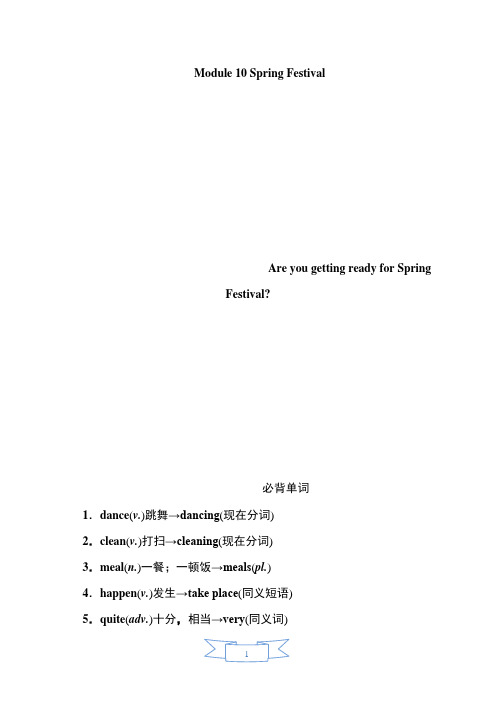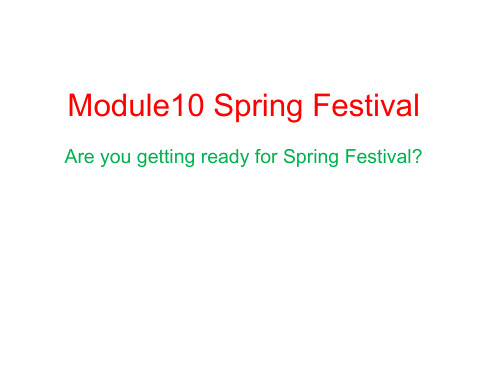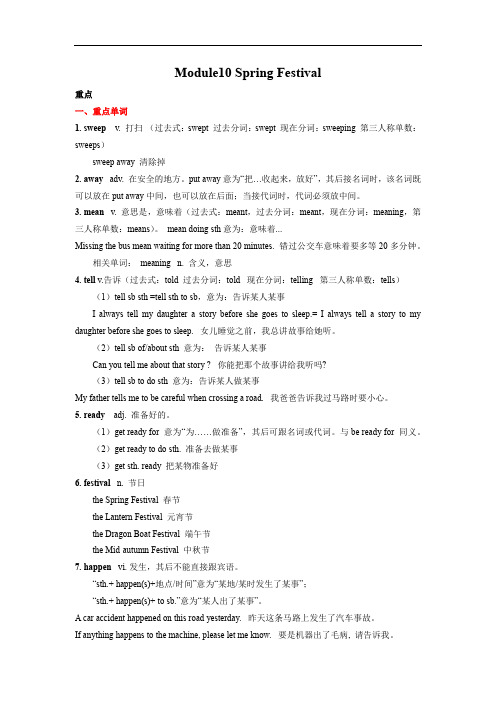七年级英语上册Module10SpringFestivalanternfestival,InChineseis课外延伸素材(新版)外研版
- 格式:doc
- 大小:89.00 KB
- 文档页数:2

Module 10 Spring FestivalAre you getting ready for SpringFestival?必背单词1.dance(v.)跳舞→dancing(现在分词)2.clean(v.)打扫→cleaning(现在分词)3.meal(n.)一餐;一顿饭→meals(pl.)4.happen(v.)发生→take place(同义短语)5.quite(adv.)十分,相当→very(同义词)6.hurry(v.)赶快,匆忙→hurries(第三人称单数形式) 7.lantern(n.)灯笼8.dragon(n.)龙9.sweep(v.)打扫;清扫10.floor(n.)地板11.cook(v.)烹调;煮;烧12.speak(v.)说话,讲话13.festival(n.)节日14.beautiful(adj.)漂亮的,美丽的15.away(adv.)在安全的地方;在通常存放的地方16.hard(adv.)努力地;(adj.)艰难的,困难的17.join(v.)参加;加入必背短语18.get ready for为……做好准备19.at the moment此刻,目前20.at work在工作21.put away收起,收拾好22.hurry up赶快必背句子23.This is Tony speaking.我是托尼。
24.I'm making big red lanterns.我在做大红灯笼。
25.She's working so hard!她正如此努力地干活!26.Can I join them?我可以加入他们吗?My mother's cleaning our houseandsweeping away bad luck.必背单词1.before(prep.)在……之前→after(反义词)在……之后2.luck(n.)运气→lucky(adj.)幸运的→luckily(adv.)幸运地3.celebrate(v.)庆祝→celebration(n.)庆祝4.traditional(adj.)传统的→tradition(n.)传统5.Christmas(n.)圣诞节6.merry(adj.)愉快的,高兴的7.February(n.)二月8.January(n.)一月9.table(n.)桌子10.dumpling(n.)饺子,团子11.programme(n.)(电视)节目12.sweater(n.)厚运动衫;毛线衣13.coat(n.)外套14.mean(v.)意思是;意味着必背短语15.sweep away扫去16.Spring Festival春节17.a kind of一种18.bad luck坏运;霉运必背句子19.It usually comes in February, but sometimes it comes in January.它通常是在二月份,但有时在一月。



Module10 Spring Festival重点一、重点单词1. sweep v. 打扫(过去式:swept 过去分词:swept 现在分词:sweeping 第三人称单数:sweeps)sweep away 清除掉2. away adv. 在安全的地方。
put away意为“把…收起来,放好”,其后接名词时,该名词既可以放在put away中间,也可以放在后面;当接代词时,代词必须放中间。
3. mean v. 意思是,意味着(过去式:meant,过去分词:meant,现在分词:meaning,第三人称单数:means)。
mean doing sth意为:意味着...Missing the bus mean waiting for more than 20 minutes.错过公交车意味着要多等20多分钟。
相关单词:meaning n. 含义,意思4. tell v.告诉(过去式:told 过去分词:told 现在分词:telling 第三人称单数:tells)(1)tell sb sth =tell sth to sb,意为:告诉某人某事I always tell my daughter a story before she goes to sleep.= I always tell a story to my daughter before she goes to sleep.女儿睡觉之前,我总讲故事给她听。
(2)tell sb of/about sth 意为:告诉某人某事Can you tell me about that story ?你能把那个故事讲给我听吗?(3)tell sb to do sth 意为:告诉某人做某事My father tells me to be careful when crossing a road.我爸爸告诉我过马路时要小心。
5. ready adj. 准备好的。

Module 10 Spring Festival 知识点讲解重点短语:1.get / be ready for...... 为......做准备get/be A ready for B 为B准备A2.Spring Festival 春节3.make big red lanterns 制作大红灯笼4.learn a dragon dance 学舞龙5.clean the house 打扫房屋6.sweep the floor 打扫地板7.cook the meal 烹调食物8.be busy with sth 忙于某事be busy doing sth 忙于做某事9.be at work=be working 正在工作10.put sth away 把......放好; 整理......11.work hard 努力工作;study hard 努力学习12.jion sb 加入(某些人)13.hurry up 快点,赶快14.hurry to +地点匆忙到 ......hurry to do sth 匆忙做某事in a hurry 匆忙的15.sweep away bad luck 扫除霉运16.have a look at... =look at... 看一下......17.celebrate Spring Festival 庆祝春节18.have a traditional family dinner 吃一顿传统的家庭团圆饭19.so much +不可数如此多的......(不可数名词) so many +可数如此多的......(可数名词)20.watch a special programme on TV 在电视里看一个特别的节目21.wear new clothes 穿着新衣服22.lucky money 压岁钱23.have a big family dinner 吃一顿丰盛的家庭团圆饭24.traditional food 传统食品25.on Christmas Day 在圣诞节26.Merry Christmas 圣诞快乐27.say happy new year to sb 祝某人新年快乐28.learn a lion dance 学习舞狮29.get presents from... 从......收到礼物30.at Lantern Festival 在元宵节重点句子:1.Hi, Lingling. This is Tony speaking. 您好,玲玲。

外研版英语七年级上册M10-2《Spring Festival》说课稿一. 教材分析外研版英语七年级上册Module 10-2《Spring Festival》是一篇关于中国传统节日春节的文章。
本文主要介绍了春节的起源、习俗和活动,如放鞭炮、贴对联、吃团圆饭等。
文章旨在让学生了解和传承中国传统文化,提高他们对英语语言的应用能力。
二. 学情分析七年级的学生已经掌握了一定的英语基础,能够进行简单的听、说、读、写操作。
但他们在语言表达和文化背景知识方面还存在不足,因此需要在教学过程中加以引导和培养。
此外,学生对于中国传统节日的了解可能有限,需要在课堂上进行补充和拓展。
三. 说教学目标1.知识目标:让学生掌握关于春节的词汇和表达方式,如springfestival、traditional customs、firecrackers等。
2.能力目标:培养学生用英语描述节日习俗和活动的能力,提高他们的语言运用能力。
3.情感目标:培养学生对传统文化的认识和热爱,增强民族自豪感。
四. 说教学重难点1.重点:让学生掌握关于春节的词汇和表达方式,以及能够用英语描述节日习俗和活动。
2.难点:如何引导学生运用所学知识进行实际交流,提高他们的语言运用能力。
五. 说教学方法与手段1.任务型教学法:通过设定各种任务,让学生在完成任务的过程中运用所学知识,提高他们的语言实际运用能力。
2.情境教学法:创设相关的情境,让学生在真实的环境中感受和体验春节的氛围,激发他们的学习兴趣。
3.多媒体教学手段:利用多媒体课件、视频等资源,丰富教学内容,提高学生的学习积极性。
六. 说教学过程1.导入:通过播放春节气氛的视频,引导学生谈论春节的相关话题,为新课的学习做好铺垫。
2.呈现:展示文章标题《Spring Festival》,引导学生预测文章内容,激发他们的学习兴趣。
3.阅读:分段落呈现文章,让学生独立阅读,理解文章内容,回答相关问题。
4.讲解:针对文章中的重点词汇和表达方式进行讲解,让学生充分理解并掌握。
初一英语上册(外研版)Module 10 Spring Festival知识点总结一、重点词汇lantern·基本用法lantern n. 灯笼Lantern Festival 元宵节I'm making a paper lantern for my nephew.我做了个纸灯笼给我的外甥。
dance·基本用法1. dance v. 跳舞(过去式:danced 过去分词:danced 现在分词:dancing 第三人称单数:dances)dance to the music 伴着音乐跳舞I like to dance to the music on the radio.我喜欢随着广播里的音乐起舞。
2. dance n. 舞蹈May I ask you for a dance, Lily?莉莉,我可以请你跳舞吗?clean·基本用法1. clean vt. 打扫,弄干净(过去式: cleaned 过去分词: cleaned 现在分词: cleaning 第三人称单数: cleans)She got up early and cleaned the flat.她早早就起了床,把公寓打扫干净。
2. clean adj. 清洁的,干净的You must keep your clothes clean.你必须保持衣着整洁。
sweep·基本用法sweep v. 打扫(过去式:swept 过去分词:swept 现在分词:sweeping 第三人称单数:sweeps)He picked up the broom to help me sweep the floor.他拿起扫帚帮我扫地。
floor·基本用法floor n. 地板,地面Jack's sitting on the floor watching TV.杰克正坐在地板上看电视。
cook·基本用法1. cook vt. 烹调,煮,烧(过去式: cooked 过去分词: cooked 现在分词: cooking 第三人称单数: cooks)Will she cook dinner this evening?她今晚要做晚饭吗?2. cook n. 厨师The cook went to see the cake left in the oven.炊事员去照看炉子里的蛋糕了。
lantern festival,In Chinese is 元宵节
The Lantern Festival falls on the 15th day of the 1st lunar month, usually in February or March in the Gregorian calendar. As early as the Western Han Dynasty (206 BC-AD 25), it had become a festival with great significance
This day's important activity is watching lanterns. Throughout the Han Dynasty (206 BC-AD 220), Buddhism flourished in China. One emperor heard that Buddhist monks would watch sarira, or remains from the cremation of Buddha's body, and light lanterns to worship Buddha on the 15th day of the 1st lunar month, so he ordered to light lanterns in the imperial palace and temples to show respect to Buddha on this day. Later, the Buddhist rite developed into a grand festival among common people and its influence expanded from the Central Plains to the whole of China.
Till today, the lantern festival is still held each year around the country. Lanterns of various shapes and sizes are hun g in the streets, attracting countless visitors. Children will hold self-made or bought lanterns to stroll with on the streets, extremely excited.
"Guessing lantern riddles"is an essential part of the Festival. Lantern owners write riddles on a piece of paper and post them on the lanterns. If visitors have solutions to the riddles, they can pull the paper out and go to the lantern owners to check their answer. If they are right, they will get a little gift. The activ ity emerged during peo ple's enjoyment of lanterns in the Song Dynasty (960-1279). As riddle guessing is interesting and full of wisdom, it has become popular among all social strata.
People will eat yuanxiao, or rice dumplings, on this day, so it is also called the "Yuanxiao Festival."Yuanxiao also has another name, tangyuan. It is small dumpling balls made of glutinous rice flour with rose petals, sesame, bean paste, jujube past e, walnut meat, dried fruit, sugar and edible oil as filling. Tangyuan can be boiled, fried or steamed. It tastes sweet and delicious. What's more, tangyuan in Chinese has a similar pro nunciation with "tuanyuan”, meaning reunion. So people eat them to denote union, harmony and happiness for the family.
In the daytime of the Festival, performances such as a dragon lantern dance, a lion dance, a land boat dance, a yangge dance, walking on stilts and beating drums while dancing will be staged. On the night, except for magnificent lanterns, fireworks form a beautiful scene. Most families spare some fireworks from the Spring Festival and let them off in the Lantern Festival. Some local governments will even organize a fireworks party. On the night when the first full moon enters the New Year, people become really intoxicated by the imposing fireworks and bright moon in the sky. 元宵节为什么要放灯
在很早以前,天上有一只神鹅落到人间,被猎人射伤。
玉皇大帝非常生气,下旨在正月十五日派天兵天将到人间放火。
天宫中有一个善良的仙女冒险下凡,把这个不幸的消息告诉人们。
于是人们想出一个办法,家家户户挂起红灯,燃放烟火。
天兵打开天门正准备下来放火,看
到人间火光一片,以为火已经烧起来了,就去禀告玉皇大帝,不必再下凡放火了。
这样,人们的生命和财产都保住了。
从此,每逢正月十五日,家家户户都张灯结彩放鞭炮,一直延续到现在。